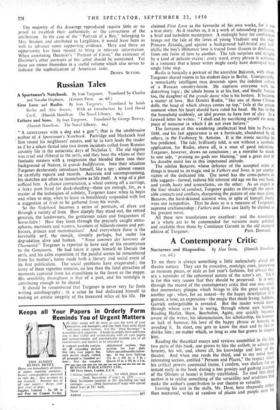Russian Tales
A Sportsman's Notebook. By Ivan Turgenev. Translated by Charles and Natasha Hepburn. (Cresset Press. 9s. 6d.)
First Love and Rudin. By Ivan Turgenev. Translated by Isaiah Berlin and Alec Brown. With an Introduction by Lord David Cecil. (Hamish Hamilton. The Novel Library. 6s.) Fathers and Sons. By Ivan Turgenev. Translated by George Reavey. (Hamish Hamilton. The Novel Library. 6s.)
' " A GENTLEMAN with a dog and a gun ";- that is the unobtrusive author of A Sportsman's Notebook. Partridge and blackcock lead ' him round his neighbours' estates, and he in turn leads the reader as if by a silken thread into two dozen incidents culled from Russian country life in the autocratic days of Nicholas I. The old regime was cruel and illiberal to the serfs, and they bore the whims of their fantastic masters with a resignation that blended them into their background of Nature, la grande indifferente. Into their situation Turgenev dexterously introduces himself, like a spy ; almost unseen he carefully reports and records. Accurate and uncompromising, his sketches are often as inconclusive as life itself. A wisp of a plot sufficed him. A chance conversation, a wheel coming off a carriage, a leaky punt hired for duck-shooting—these are enough, for, as a master of the techniques of subtlety, Turgenev knew when to begin and when to stop, when to leave us breathlessly suspended with but a suggestion of fruit to be gathered from his words.
So the Notebook becomes a series of portraits, of slices cut through a variety of lives. How sharply they stand out, the retired generals, the landowners, the gentlemen rakes and frequenters of horse-fairs ! How they loom through the precisely caught atmo- spheres, martinets and wasters, haunters of billiards-rooms and pot- houses, princes and monomaniacs! And everywhere there is the inevitable serf, the moujik, slovenly perhaps, but under his degradation alive and human. "Nous sommes des hommes de l'humanite," Turgenev is reported to have said of his countrymen to the Goncourts. He had taken it upon himself to liberate the serfs, and his calm exposition of the painful scenes he remembered from his mother's home made both a literary and social event of its first publication. The social problems have evaporated ; the irony of these vignettes remains, no less than the fatal attraction of moments captured from his expeditions to the forest or the steppe. His sensibility throughout is that of a poet, and his nostalgia is convincing enough to be shared. It should be remembered' that Turgenev is never very far froin writing autobiography ; in a sense he had dedicated himself to making an artistic integrity of the treasured relics of his life. He claimed First Love as the favourite of his own works, for it was a true story. As it reaches us, it is a work of astounding perfection, a brief and turbulent masterpiece. A midnight hour for confidences brings out the tale of the loves of young Vladimir and the older Princess Zinaida, and against a background half-brutal and half. idyllic the boy's immature love is traced from illusion to disillusion, from one form of love to. another. The tale surprises and delights by a kind of delicate excess ; every word, every phrase is authentic in a romance that a lesser writer might easily have destroyed by a single false step.
Rudin is basically a portrait of the anarchist Bakunin, with whom Turgenev shared rooms in his student days in Berlin. Unexpectedly, a remarkably intelligent man descends upon the indolent culture of a Russian country-house. He captures everyone with his disturbing logic ; the whole house 'is at his. feet, and finally Natalia too, the daughter of the grande dame who is his hostess. It becomes a matter of love. But Dimitri Rudin, " like one of those Chinese dolls, the head of which always comes up top," fails at the precise moment when his heart should have ruled his head. He has to flee the household suddenly, an idol proven to have feet of clay. In a farewell letter he writes: "I shall end by sacrificing myself for some piece of nonsense in which 'I do not even believe."
The fortunes of this wandering intellectual lead him to Paris in 1848, and his last appearance is on a barricade, abandoned by all others, in the Faubourg St. Antoine. It is the ironic sacrifice lie has predicted. The tale, brilliantly told, is not without a symbolic application, for Rudin, above all, is a man of good intentions. Turgenev, however, draws no conclusion ; as a moralist he stands to one side, " praising no gods nor blaming," and a great deal of his durable merit lies in this impersonal attitude.
The nihilist Bazarov, whose defiance of the accepted order of things is traced to its tragic end in Fathers and Sons, is yet another victim of the dedicated life. The novel has the cross-pattern its title suggests—formal, tedious Mt tolerant old age on the one hand, and youth, hasty and iconoclastic, on the other. As an expert in the finer shades'of conduct, Turgenev guides us through the inevit- able contacts and conflicts, sharpening the picture of one man alone, Bazarov, the hard-skinned scientist who, in spite of himself, finally wins our sympathies. That he does so is a measure of Turgenev's supreme craftsmanship ; Fathers and Sons can fairly be claimed as his greatest novel.
All these new translations are excellent: and the translators as a whole are to be commended for versions more polished and readable than those by CortStance Garnett in the old standard






































 Previous page
Previous page